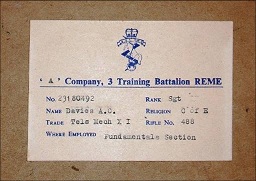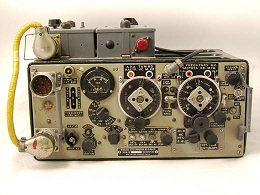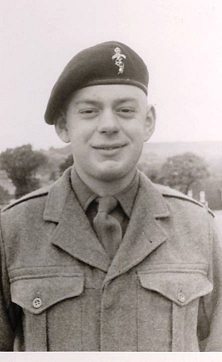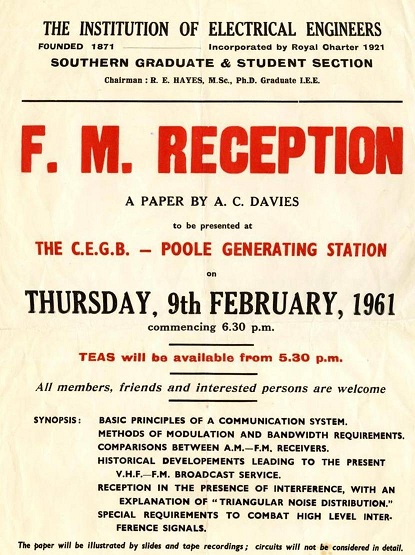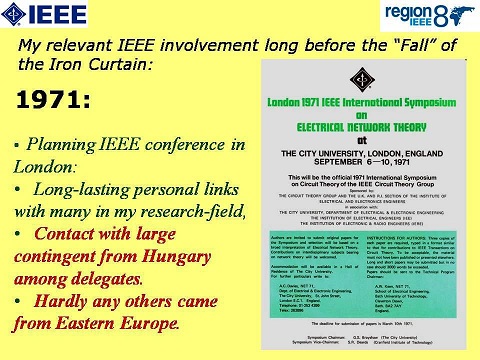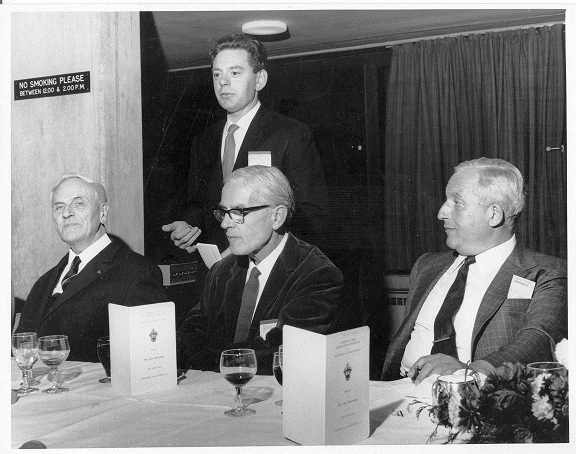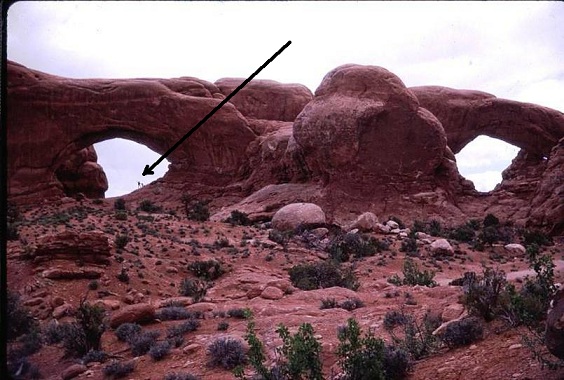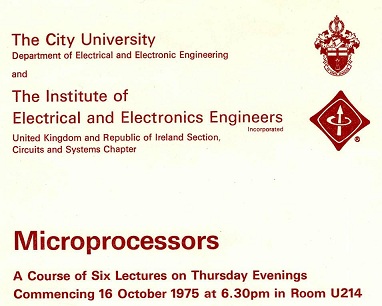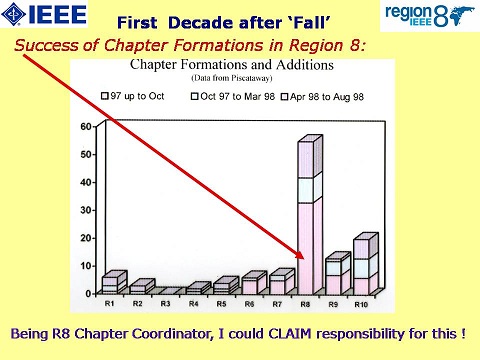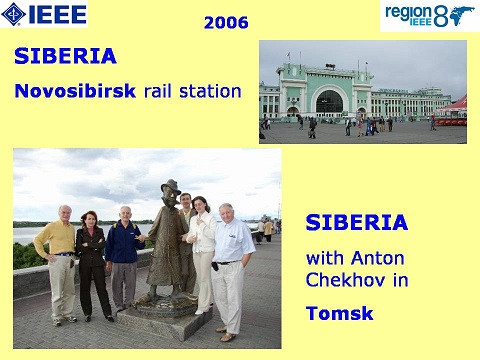First-Hand:Recollections of a Region 8 Director
Submitted by Anthony C Davies, Region 8 Director 2003-2004
In order to explain adequately my time as Region 8 Director, I will start by providing the context in which I became an IEEE member and active volunteer.
My Origins and joining the Army
I was born at Rainham in Kent, England, in 1936. A few years later, World War Two started, and I went with my mother to live with relatives in the relatively peaceful Gloucestershire countryside. The big house in which we lived had no electricity, no gas supply and no drinking water supply. To get drinking water, we had to go down a lane and collect it from a well. Moving from one set of relatives to another, etc. I went to many different schools, but apparently that did not damage my education, and from about 13 years of age, I stayed at the same school at Cranbrook, in Kent.
No one explained to me that it was possible to study electrical engineering at a university, and in reality I had little idea what a university really was, so against all advice, I insisted on not delaying my (then compulsory) military service until after university study. Generally I was advised that if I went into the army, I would never get back to continuing my education. Ignoring this advice proved to be to my great advantage.
As a result, I then went for two years into the British Army, where I was in the Royal Electrical and Mechanical Engineers, and trained in the repair and maintenance of army communications equipment (such as the WS.19 illustrated in the photo). An interesting time during which the Suez Crisis took place and also the Hungarian Revolution.
First activities as a 'volunteer'
During my army service, the standard advice was ‘never volunteer’: it will be seen that I did not take this advice! During my subsequent time as an electrical engineering undergraduate at Southampton University, the Head of Department persuaded me to join a local IEE committee; as a result I met various senior engineers, and had responsibilities to organise ‘events’ which included giving a lecture-demonstration on frequency modulation. Preparation for this included library searches, by which I became very familiar with and impressed by the IRE Proceedings and other IRE publications.
I had built a tape-recorder (rather a rare item in those days) - it used 7 inch tape reels and enabled me to take demonstration-recordings to support my lecture (even though the tape-recorder was so heavy that I could barely lift it!)
Later, working for the General Electric Co. at Coventry, I regularly used IRE Transactions, etc. and followed the discussions about the proposed AIEE-IRE merger.
Joining IEEE and becoming immersed in Conference Organisation
Over all this time, I had no expectation of joining as a member. It was after joining academia that I became involved with the local (by then IEEE) UKRI Circuit Theory Chapter, and joined as a member of IEEE (in 1967). The Chapter was then very active, and when I went to British Columbia for a year (1968-1969), I naturally took interest in what IEEE did locally (actually not much, but far more than the local IEE branch in Vancouver, which did nothing at all). On return to England, I became deeply involved in the organisation of an IEEE conference in London: this brought me into personal contact with many of the key people in my research field (some later became IEEE Society Presidents, etc.). The conference was the first held by the IEEE Circuit Theory Group (now CAS Society) outside the USA, and its success initiated the regular holding of ISCAS in many locations around the world.
Having been asked to attend the Organising Committee and not really knowing what an International Conference was, I was almost immediately appointed 'Local Arrangements Chair', and soon learned that most of this large committee would not do any actual work for the conference, only talk about it.
It fell to me to give a speech at the conference banquet - something I had never done in my life before - howefver, it seemed to be a good success. The photo below (taken by the University Photographer, Ted Willetts), shows B.D.H. Tellegen on the left (from Delft, Netherlands, the 'guest of honour' at the conference) and Arthur Stern (later to become IEEE CAS President and IEEE President). Sitting in the centre is George Brayshaw, my older colleague whose idea the conference was.
Very soon after that I attended a Summer School on Circuit Theory at Tale, in Czechoslovakia (n the low Tatras mountains - what is now Slovakia). This, my first visit to a Communist country, introduced me to many of the 'realities' of life there, and provided the chance to meet many engineers, etc. who were then not allowed to visit the "West". This laid a kind of foundation for later contacts and making some contributions to the spread of IEEE activities in these parts of Europe after the fall of the Berlin Wall.
Since then, being an active ‘IEEE volunteer’ has been a part of my life, and I would say that the two features which I liked best were its international/transnational nature and its distributed management, whereby junior, local people (such as myself) had the freedom and power to initiate, arrange and control local events. This was a big contrast to IEE, in which I was also a volunteer in various ways, which had very rigid centralised control. I became involved at the UKRI Section level as a result of being asked to assist with the business of Conference Sponsorship: at that time, the Section received many invitations to co-sponsor conferences, from IEE, Institute of Physics, etc., and this usually required finding a suitably-qualified IEEE member to serve on the organising committee as IEEE representative.
Attending IEEE conferences in USA was generally too expensive for me. However, the start of cheap flights by Laker Airways enabled me to attend two conferences in Canada in early 1973. I travelled on the first Laker “advance booking charter” flight, in a DC-10, with a round-trip fare of £45 (no added taxes or supplements or surcharges then!). Later I went to Purdue University for a year as a visiting professor (1973-1974) – which also brought me into more contact with IEEE members and IEEE events (including the 1974 ISCAS in San Francisco, my first visit to California) and the opportunity to vist places like the Grand Canyon, Bryce Canyon, etc. as a tourist.
Soon after that, I became involved in running short courses on Microprocessors, the first of these being a joint operation of the IEEE UKRI Section and The City University. Some perhaps relevant remarks about that are that we really had no aims of 'making money' from running such courses (a big contrast to the attitude of most universities in UK today), the aim was only to 'cover our basic costs' and provide an affordable course for practising engineers who were becoming very interested in what these new components might be able to do. It also indicates the 'informality' and lack of bureaucracy in IEEE, we did not really have to get prior 'approval' from anyone except the UKRI Section Committee. This is a big contrast to IEE at the time, which was unable to arrange such an event (even had they wished to) without a lengthy process of budget approvals and the like.
I went on to teach microprocessor courses for many organisations (including the George Washington University, for whom I later taught courses in Washington and Berlin, but not in any way connected with IEEE).
First (favourable) experience of Region 8 Committee
I was invited (at short notice) in April 1978 to attend (as ‘observer’) a R8 Committee meeting in Eindhoven, because they needed a judge for a student paper contest. The R8 Committee was then quite small (the Minutes record an attendance of twenty people), but what left a lasting impression on me was this group of people from many countries, sitting around a big table in the Philips company boardroom, involved in friendly and cooperative discussions of many issues, which struck me as in marked contrast to the way that typical international meetings of politicians take place.
Another relevant memory is a nice visit to IEEE at Piscataway. I was on my way to an IEEE conference in Philadelphia in 1987, and because of some issues connected with a student-exchange-link between The City University in London and Rutgers University, the suggestion arose that I should visit the latter en route, since that could be done for a small incremental cost. I shared a rented car with a colleague from University of Kent at Canterbury, which we collected at Kennedy Airport, and spent a few days travelling to Philadelphia, visiting Rutgers University on the way. This gave me the opportunity to visit IEEE Piscataway – with which I already had some personal contacts in the part then called ‘IEEE Field Services’ – what later became Regional Activities, I suppose.
First steps on the ladder to R8 Director
The steps towards becoming R8 Director really started in the early 1990s when Andre Vander Vorst asked me to become the R8 CAS Chapter Coordinator – the aim was to increase the activity of the existing Chapters and encourage the formation of new Chapters where there were sufficient CAS members – this was at a time of many changes and new opportunities which followed the removal of the Berlin Wall. This brought me into regular contact with the R8 Committee by attendance at its meetings (I had attended a few of these meetings previously for various reasons). My activities included arranging Chapter Chairs’ meetings, and forming stronger links with the CAS Society management.
Then, e-mail was in its infancy, and my academic-base gave me a better framework for making use of this for international communications. All this led, among other things, to being elected to the CAS Society Board of Governors as Vice President for R8. Being at a time when the Society had rather substantial financial reserves, and an expanding programme of activities, meant that as a member of the CAS ExCom I had the opportunity to attend meetings in all sorts of interesting places which I might otherwise have never visited. I was also elected as UKRI Section Chair, which of course included attending the R8 Committee meetings, twice per year, as Section representative.
Discovering the IEEE Board Series meetings
Notable steps along the way towards being elected as R8 Director included attending a meeting of Chapter Chairs in New Orleans, in February 2000. This was followed by the IEEE Board Series meetings, which I was able to remain in New Orleans to observe. I was struck by the scale of this operation: I thought I knew all that mattered about the way IEEE operated, but realised that there was a whole world of activity on a large scale (meetings of TAB, RAB, EAB, BoD and many more) about which I had been almost unaware. Later, a significant step was standing in as a voting member for the CAS President at a TAB meeting when some important issues for CAS were being decided, from which I became better aware of TAB operation. My success at R8 Chapter Coordination, including the stimulation of new chapters (especially in Eastern Europe where new opportunities were arising) and arranging Chapter Chair meetings, led me to being elected by the R8 Committee as Vice Chair for Technical Activities. By then I was rather well known to the R8 Committee membership, and was nominated as a candidate for R8 Director.
I suppose that I did not expect to be elected. I did not do any active ‘electioneering’ and thought that it was sufficient to provide my biography and a position statement. I was rather surprised to get a late-evening long-distance phone call from Ray Findlay (then IEEE President), and even more surprised to be told by him that I had been elected (I had not realised that this was the method to inform successful candidates).
I feel that it is somewhat regrettable that now candidates typically spend a huge time and effort (and sometimes much personal money) in promoting their own candidature.
At that time, the Director-Elect term was one year, not two, but I feel that I was very well prepared before that, because of my involvements with the R8 Committee and with the CAS Society in many ways over many years, and because I had met quite a few of the staff from Piscataway at various events. What I also believe is very important is that my ‘connections’ were with both the Technical (e.g. Society) side of IEEE and with the Geographic (e.g. Region) side of IEEE. I feel it is regrettable that some senior volunteers (including some Section Chairs and some Society Board of Governors members) seem to connect with only one of the two.
Confidentiality and Openness
I have always liked the open nature of IEEE's committee meetings. At all levels, only those parts of a few meetings concerned with really confidential matters (for example accusations of non-ethical behaviour, discussing candidates for nominations and appointments and for personal awards) naturally need to be confidential and so are held behind closed doors (e.g. in executive session).
In most other cases meetings are open to all members as observers, and often the chair gives such observers an opportunity to make comments and ask quesions if time permits. The principle that the meetings are open to all is, I believe, very valuable.
Given the total numbers of members, it would, of course, be a severe problem if they were all to turn up to observe the same meeting. However,we safely rely on probability theory that in practice only a few will arrive, and so it is never necessary to hire a sports stadium 'just in case'. As when introducing junior students to the random thermal motion of molecules in materials, there is sometimes one who asks a question such as "if the motion is really random, what if all the molecules in a brick were to move upwards at the same instant, wouldn't the brick float up in the air all by itself".
When I first had an opportunity to be in the same hotel at the same time as an IEEE Board of Director's meeting, I was glad to be welcomed as an observer, though less impressed to observe on that occasion how they spent a huge amount of time discussing the detailed phrasing of some document, much of the debate seeming to be a not very well informed discussion of punctuation and grammar. I was actually somewhat dismayed that these senior volunteers, many from very significant 'real-life' jobs, were spending so much time in this way, but that did not reduce my liking for the open nature of the meeting.
This is another favourable contrast with practice in the IEE. In the past, all IEE committee documents were unnecessarily headed with the phrase 'Confidential to Institution Committees' (except for a few, headed 'confidential to recipient').
When I was an elected member of the IEE Council (some 30 years ago) there was an agenda item to decide whether the railings outside the building should be painted black or green, and the brief supporting document prepared by staff had this standard "confidential" statement at the top. The Council members wanted to know why this was confidential, and of course there was no good reason that anyone could think of. That led to some moderation of the policy, although the present IET is also still somewhat inclined towards a preference for unnecessary confidentiality.
In IEEE, I once sat alongside a Region 8 Director-Elect who expressed annoyance that the Region 8 Committee meeting was attended by a number of subcommittee members and local Section and Chapter people, and he considered that all non-voting and subcommittee members should have gone home. Clearly his preference would have been a small committee meeting behind closed doors. I do not think he welcomed my advice that IEEE was not run in that manner.
On another occasion, during a Region 8 Committee meeting while I was Director, I encountered in the elevator someone who I found out was an IEEE member (from a quite distant R8 Section) but who was in the hotel for a quite different reason (a meeting on air-traffic control).
I invited him to attend the R8 Committee meeting as an observer, and then, since the Section Chair from his Section had failed to turn up, encouraged him to sit in the seat intended for his absent Section Chair. I also invited him to the evening dinner of the committee. Of course this was totally 'unofficial' but I think that it is evidence of how IEEE allows local decisions to be made, I did not feel it necessary to ask the permission of the IEEE Chief Executive, believe it all had a favourable impact on his Section when he returned home, and I also had the pleasure of meeting him again some time later when I happened to be in the airport where he worked (during a snow-storm which delayed all flights and created some confusion).
Some might suggest that allowing him a place at the dinner was a misuse of IEEE resources, but I am wlling to face a disciplinary committee to defend and justify my actions if that is the consequence!
It has been my experience that despite the 'local freedom' given to IEEE volunteers, the incidence of significant misuse of IEEE funds or other forms of corruption is very rare. Of course, there have been a few cases and a few suspicions that I am aware of, but compared to what we now know is routine in the financial and banking worlds, IEEE volunteers seem close to sainthood in this respect (and I do not believe the cynical who might claim that the IEEE volunteers are corrupt but too clever to get caught).
Some big issues at the time that I was Director
Three major issues which I remember as being prominent during my time as R8 Director were the IEEE sanctions on Iran members, the Transnational Committee business, and discussions about IEEE Governance (e.g. possible changes to the Board of Directors structure). The Iran sanctions problem was a particularly unwelcome situation, because of the outrage felt particularly by many of the younger members in R8 at what they felt was a failure of IEEE to behave in accordance with its own code of ethics. There seemed a risk that the reactions could spread to the destruction of the very good and active student branch activities throughout R8. The Board spent rather a lot of time discussing 'Governance' where the viewpoints swung between ideas to have a much smaller board (in the expectation that would enable decisions to be made more quickly) and having a much larger board so as to have representation from more 'communities' in IEEE. The Board did not succeed in making any clear decisions despite much discussion and time spent. I recall suggesting that was perhaps fortunate: if the Board made a lot of quick decisions, they might be the wrong ones and IEEE might be harmed. If they made very few decisions, leaving as many decisions as possible to the more junior OUs (Regions, Sections, Chapters) that might be much better for the long term health of IEEE.
Remembering my contributions to the Board of Directors
Perhaps my overall memory of my volunteer activity in IEEE, including being a Director, is of ‘meeting interesting and talented people’, which is one of the rewards of IEEE volunteer activities. Specifically, I saw my role on the Board as including keeping the Board members ‘aware’ of the differences between the needs, wishes, culture and general situation of R8 compared to R1-6 (and to some extent R7). It is important to realise that this was not an attempt to get special favours for R8 (e.g. not what is called ‘pork-barrel politics’). The responsibility of Directors is clearly to IEEE as a whole and not to the Region (or Division) which elected them. Additionally I saw my role as taking back to the IEEE committees in R8 information about the Board of Directors discussions and decisions, and where appropriate to seek their opinions. So, in serving IEEE as a Director I perceived my main duties to be (i) to inform the BoD about R8 issues (ii) to inform the R8 Committee about activities at the higher levels of IEEE (BoD, RAB, TAB) and at the same time to generally promote and explain what I considered to be the good features and activities of IEEE. This included travelling to events where I could explain about the structure and achievements of IEEE, and encourage membership development (by which I mean not only getting more members, but helping existing members to get more from their membership, and stimulating Chapter and Student Branch activity).
Within this context. I tried to ‘entertain’ and even ‘educate’ the members of the BoD, by bringing a distinct and different perspective that they might not otherwise have seen. I reported to them a ‘visit to Crna Gora’ specifically to see if any had the courage to ask where it was – none did have the courage, though I am sure that few, if any, knew.
On another occasion, there was an e-mail to the BoD members which I thought was not intended as a serious suggestion (though apparently I was wrong about that) so I decided that it merited a humorous reply, and as that seemed to be generally appreciated. it is therefore reproduced below (with the name of the author of the original e-mail replaced by H***** for anonymity):
H*****,
One difficulty I see in your proposal is that some countries do not have a letter 'C' in their alphabets (or would you prefer me to write 'alfabet' ?) and in some it is a soft 'c' (like 's' in American but not like 's' in Hungarian) while in others it is a hard 'c' (like 'k' in American).
So how would C-IEEE be pronounced? (like the start of 'kayak' ? or like the start of 'Simon'?).
If IEEE-Canada becomes C-IEEE what would a future IEEE-China become? The same?
If IEEE-USA becomes A-IEEE, what will you do about IEEE-Austria and IEEE-Australia. I know that many in USA do not distinguish these two and expect to see kangaroos in Vienna (otherwise known as Wien or Becs, so be careful about just using the initial letter).
Perhaps most people in USA are aware that there is a place called South America which is not part of the USA, and there are surely some who know that USA does not include the whole of North America - so the attempted equivalence of 'USA' and 'America' is not a good one. If adopting this single-initial designation, then IEEE-USA should therefore become U-IEEE - along with IEEE-Uruguay and IEEE-Ukraine and IEEE-United-Kingdom-and-Republic-Ireland.
If that does not seem appropriate for some reason, how about C-IEEE for IEEE-USA as a reminder of Columbus, who certainly was not the discoverer of America anyway. If IEEE-USA and IEEE-Canada both become C-IEEE that could be a first step that would upset mainly the Quebecois, and a later step could be to use C-IEEE for IEEE-Continental-Europe, IEEE-Chile and IEEE-Celtic-Nations.
C-IEEE would also naturally be used for IEEE-Cyprus (North and South) and, by the proponents of the 'hard-c' pronunciation, it would do for IEEE-Korea (North and South). In any case, IEEE-China (and Taiwan, of course, and all those places with big Chinatowns) would be included in the C-IEEE category.
In no time at all, we would find that C-IEEE covered the whole world and a simple motion of a future BoD to make huge savings in toner and ink by dropping the 'C-' and reverting to the simpler name of 'IEEE' could take place in about 100 years time.
As previously remarked on another occasion, by moving the staff operations from Piscataway to somewhere in Estonia, IEEE would be able to replace the domain name @ieee.org by @ie.ee, which would be much more distinctive, and the 'dot' before the last 'ee' would be a constant reminder of the reduction in infrastructure costs of (at least) 100 achieved by the offshore relocation. IEEE itself could be renamed IE.EE as a further reminder, and all these changes would save further money because it would be possible to postpone the hiring of costly consultants to propose a new corporate image for IEEE, we would have done it all ourselves.
Rather than your suggested implementation date of 1 Jan 2006, I propose 1 Apr 2006 (that is if we cannot get it completed on 29 Feb 2005).
Tony Davies
******* 2004 (in reply to e-mail below)
At *******04, H***** wrote:
Since I seem to be creating no controversy at all. how about some comments on this (copied below and attached).
H***** Motion – Single (or multiple country) IEEE organizations will use a naming convention that shall consist of a letter that designates a country or a group of countries, a dash, and IEEE. For example, IEEE-USA will become A-IEEE for American IEEE, and IEEE Canada will become C-IEEE. Future single/multiple country IEEE organizations will follow this new naming model (or perhaps E-IEEE for European Union IEEE). Name changes to match this convention will be put in place by 1 Jan 2006.
Throughout IEEE and its supporting documentation, wherever IEEE-USA appears, it shall be changed to A-IEEE, and wherever IEEE Canada appears it shall be changed to C-IEEE. Statement of the problem - Through the entities of IEEE, there is concern about confusion that is created amongst the public and other organizations about the relationship of IEEE and, primarily, IEEE-USA, what a President of IEEE-USA is in relationship to the President of IEEE, etc. The similarity of names also creates confusion outside of the USA about the independence of IEEE as an international organization as opposed to an American organization. Aside from the simple change of name and acronym, there are no other or hidden changes or intentions. Pro – The change will create stronger differentiation between IEEE and the part of IEEE that represents members career and public policy interests within the USA. As we grow in the
future, we will have a uniform naming convention to use for this growth. Con – The new name will have to be socialized within the communities that now know the current OUs as IEEE-USA and IEEE Canada. Cost – Negligible (stationary, websites, banners, etc. will have to change)
(from H*****)
Cheap travel opportunities
It was a fortunate feature of the airline ticket pricing policies that in many cases, by staying for a Saturday night, it was possible to buy highly discounted tickets, making it economical to stay for extra days in some meeting location (e.g. the saving on the air fare at least paid for added hotel nights). This meant, for example, that I could often attend additional events at a Board Series meeting for less overall cost than going home earlier. I also commonly took the opportunity to extend my stay at my own expense in order to travel in the vicinity of the meeting place, and so to visit places that I would otherwise never have seen. Perhaps I should add that I have a personal preference for generally using public transport (e.g. buses, trams, etc.) rather than expensive taxi cabs, and it became customary for organisers of some of the meetings to ask me to provide a ‘travel advice’ document (usually for places that I knew fairly well from previous visits, etc. but sometimes for places which I had never visited myself!) This was before the easy availability of detailed maps and travel data on the internet, which mean that special skills and expertise is no longer needed. Over many previous years experience of attending international conferences, etc. on a very restricted budget, I had acquired skills in travelling cheaply, and finding low cost air fares, long before the internet made this ability generally available to all.
My recollections of chairing the R8 Committee for the four meetings during which I was Director include: (i) a struggle to finish on time (which was then about 1700 on a Sunday, we spent two full days, including a caucus on Saturday, with various pre-meetings on Friday). (ii) trying to get the Section Chairs to actively participate. (iii) getting the presentations by Vice-Chairs, etc. to finish on schedule. (iv) preparing the main meeting room with the help of the R8 Secretary and others – because the hotels were often only partially ready for us and meeting-room access was sometimes only possible early on the Saturday morning, despite an 0800 meeting-start being usual. The (informal) policy which I supported was holding the meetings in newly-formed Sections or other Sections where R8 Committee meetings had not previously taken place, and using the smaller meetings (OpCom, N&A Committee, etc.) to visit locations in Sections where it would be impractical to take the whole R8 Committee – for example, Novosibirsk.
The importance of this was to find out about the local situation, problems, etc. and especially to meet more of their volunteers (e.g. not only the Section Chairs). I also felt that I had an indirect responsibility to keep expenses within bounds (which included assisting the R8 Treasurer in responding to a few excessive travel-expense claims). During my two years as Director, the four meetings were held in:
Reykjavík, Iceland; Zagreb, Croatia; Kraków, Poland; Stockholm, Sweden.
Being R8 Director involves a great deal of long-distance travel. Fortunately I enjoy travel, and this was possible because I had retired before becoming Director – it would hardly have been possible if I had also had a ‘real’ job at the same time. Also fortunate is that much of this travel was before the main restrictions and inconveniences which have arisen as a result of the responses to international terrorism. Sometimes my wife travelled with me, and sometimes we used this as an opportunity for some additional vacation travel – on other occasions it was either not convenient for her to travel with me or the meetings were in some obscure place where spending a few days while I was all the time in meetings was not an attraction for her – so I have to acknowledge a very tolerant wife who allowed me to spend a huge amount of time on IEEE matters, including many absences from home over many years!
After my two years as Director, I remained very active as a Past Director, which provided continuing involvement in various ways over several years. However, I think it important to record my belief that ‘hanging-on’ to IEEE positions needs to moderated by the need to allow new (and younger) people to have opportunities to be elected to IEEE positions. I have always promoted the concept that a favourable and essential feature of IEEE is that it is a member-directed, staff-supported organisation (rather than the other way around).
Concluding remarks
During much of the time that I was most involved in IEEE as a senior volunteer, the changes which had arisen as a result of the fall of the Berlin Wall and the ending of the Communist regimes in Central and Eastern Europe were taking place. This made a very interesting time, and I was glad to be somewhat prepared to contribute to that, and to take part.
I described my involvement in a paper presented at HSTELCON 2012, in September 2012 at Pavia, Italy, and this paper should in due course be included (with all the HISTELCON 2012 papers) in IEEE Xplore. My paper is entitled Go East, Region 8, Go East.
Overall. I am very satisfied with the many interesting opportunities which IEEE brought to me, and I hope that I have contributed something worthwhile in return. I am somewhat discouraged by some recent trends in IEEE, which seems to be moving towards more centralised control, more rules, and more decisions in the hands of people who have a USA-centred knowledge and outlook.
Tony Davies, based on an original written around 16th July 2012
search code: 19360804
